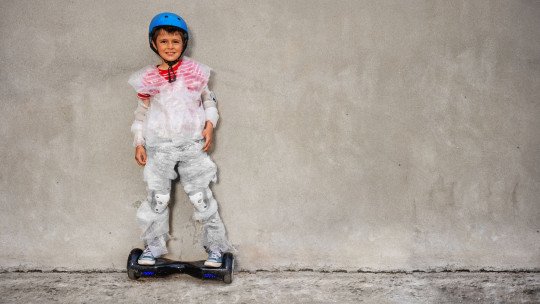How do overprotective parents behave? Why is child overprotection something we should avoid for the good of our children? Discover the effects of overprotection.

In recent decades, we have gone from excessive demands on children to excessive overprotection Before, children were highlighted for everything they did wrong and they were given great responsibilities early. Now, however, there are more and more overprotective parents who go out of their way to ensure that their children have everything.
We have gone to the opposite pole, and the harsh reality is that we find many parents who, thinking that they are doing what is best for their children, overprotect them, causing them problems in growing up and learning to be adults. But how does overprotection affect? And what are the attitudes of the overprotective parents?
What is overprotection?
Overprotecting is not only “pamper“your child by giving him/her all the whims he/she wants. You are using the overprotection If you help him or even do his homework, you don’t let him make mistakes, you don’t correct him because “He is small, and he will realize it when he grows up“, you prepare his/her backpack and tie his/her shoelaces when he/she can do it by himself/herself, you do everything for him/her because you think he/she can’t, you interfere in the conflicts he/she has with his/her friends, and a long etcetera .
Therefore, the overprotective parents They are those who monitor or control the actions of their children in an exaggerated way. Although these parents act to try to guarantee the well-being of their children, in reality these efforts end up being intrusive and even harmful. In fact, child overprotection ends up causing problems in family dynamics and affects the child’s general development.
What are overprotective parents like?
It is normal that as parents we want our children to have a good life. But, one overprotective mother or father They often experience anxiety because they want their children to be safe at all times. As a result of this anguish, they end up trying to manage everything the children do to prevent them from suffering in any way. In this way, we can identify the following attitudes in overprotective parents:
- They do their tasks and homework: One of the signs of child overprotection on the part of the parents it occurs when they take charge of the schoolwork or responsibilities that the children have.
- Excess control: The controlling parents They are also usually overprotective. One sign is that they are constantly insecure if they don’t know what their child is doing at all times.
- Manage friendships: A overprotective mother or father He will always try to influence his children’s friendships.
- Plan everything: Having overly planned and organized schedules for your children can be an attitude typical of child overprotection
- Invade your privacy: When parents try or invade the privacy of their children, in addition to being a negative and toxic attitude, it can imply a excess overprotection
- Encourage extreme dependency: That children always depend on their parents is also bad for them. Many overly ‘protective’ parents may have a tendency to encourage this type of attitude on the part of their children.
- Try to avoid damage: The overprotective parents They also tend to try everything so that their children do not fall or get hurt.
It is normal for all parents to have this type of attitude from time to time. But when these behaviors are constant, it is a clear sign of child overprotection
What are the causes of child overprotection?
The overprotective fathers or mothers They usually have this anxious attitude because they worry excessively about the dangers that children will have to face in life. In many cases, parents with these behaviors may have them due to the following causes:
- Anxiety disorder: Parents who suffer from an anxiety disorder may have an overprotective attitude toward their children because of it.
- Negative information bombardment: Currently, we live in a time where people are constantly bombarded by information. In this way, news about the danger that may occur influences the attitude of overprotective parents
- Perceived childhood vulnerability: Some parents may be overprotective of their children because they have a sensitive personality, or suffer from chronic illnesses or physical disabilities. This makes them believe that their children are more vulnerable or susceptible and that they require more protection.
- Posttraumatic stress: Some overprotective parents They may be because they have experienced a traumatic event in the past. These types of behaviors can be part of post-traumatic stress disorder.

What are the main dangers of overprotection?
Although overprotective fathers and mothers They have these attitudes in good faith, the reality is that they can harm the psychological development of their children. Mainly, child overprotection can involve the following:
- Children experience new things with stress and anxiety or with complete lack of concern: We can find ourselves with either of these two options. Not being used to doing things for themselves, children who have a overprotective mother or father, have great difficulty solving their own problems. They need a father figure to take them out of the fire and when they are not there, they feel helpless and lost. On other occasions what they do is develop a defense mechanism by which they do not face news because it is not interesting to them. They just “pass.”
- Self-esteem is not forged: That feeling of insecurity, never putting themselves to the test, not facing challenges means they don’t see what they are capable of. If they always overprotective parents They have made their problems easier, how are they going to know how to solve it themselves? They grow up as insecure people, lacking self-confidence and not knowing their abilities, virtues and defects.
- They become people without self-criticism, without empathy and demanding: If you always have someone who does things for you, when they don’t do them for you, you will demand it. If one day a book was missing from the backpack, your child will tell you that it is your fault because it is something you always do. And let’s see how you justify to him that he is not right. Even though it is your child’s responsibility, you have taken ownership of it. This demand will become more and more and they will be people who are not very self-critical (the fault will always be someone else’s) and without empathy (they will not see the efforts you make to try to ensure that your child is always as good as possible).
- They are very impatient people: By not empathizing or seeing what things cost, they will want it all now. Since parents need their children to always be happy, they will not wait for them to need things, they will give them to them first. If that pace cannot be maintained, that is when problems will appear. These children do not develop the ability to wait or benefit in the long term. They want results now and they do not and cannot wait because no one has ever taught them.
- They do not develop frustration tolerance: Like the overprotected children They always have someone to help and protect them, they do not learn to make mistakes nor do they conceive that it cannot be what they want. If they want something, it will have to be that way. If they don’t get it, they will throw a tantrum until mom or dad gets them what they want and thus you are in a vicious circle in which your child will tolerate that frustration less and less and you will see yourself as more and more of a slave. of your own child
- Social problems with peers and behavior: This lack of empathy and self-criticism can lead to conflicts with colleagues or friends and to unstable and long-lasting relationships. In addition, behavioral problems in class and even school failure can develop.
- Egocentrism and narcissism: All these risks of overprotection If maintained in the long term, they can result in people who are egocentric and narcissistic in the future., which are aspects of personality that are difficult to change once they have been forged and that generate great problems in adult life.
If you are a father or mother and you identify with this pattern, try to stop it or ask for help to achieve it. It is in your hands that your child grows with self-esteem and values that allow him or her to be a better person. You think you are helping him, but in reality you are harming him, a lot, with the overprotection Don’t let that happen.








